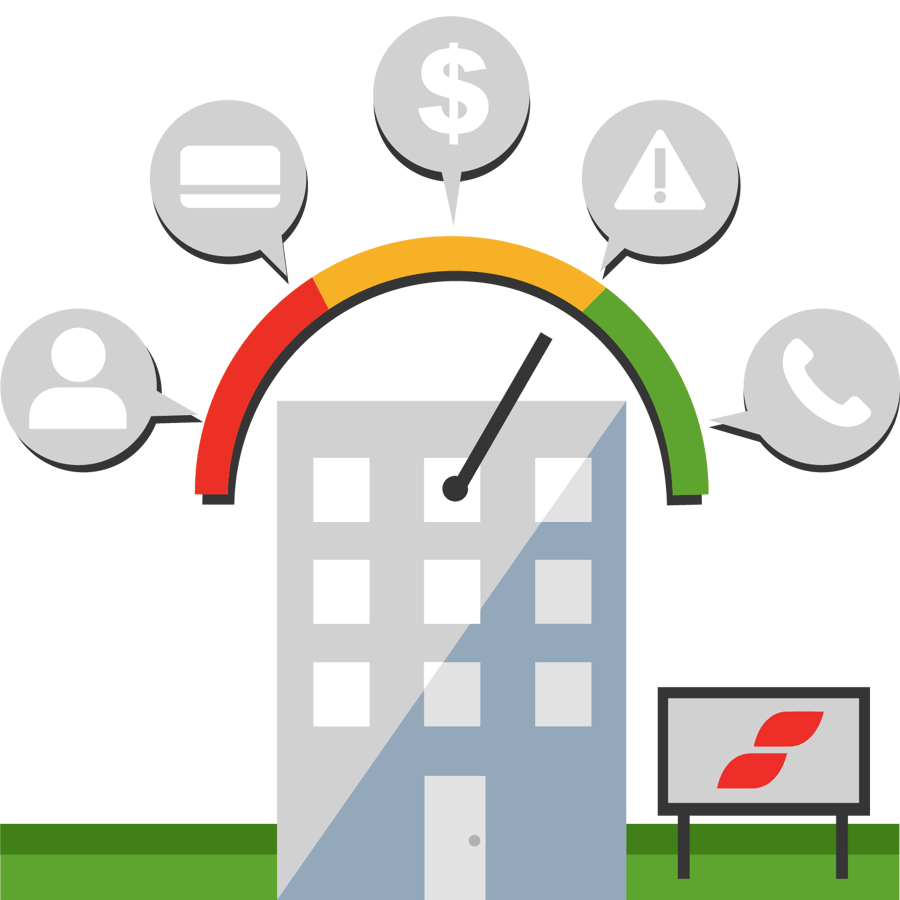Business credit score basics
A business credit score measures the likelihood that a business will remain solvent for the next 12 months
The most strategic businesses today rely on business credit scores to help them better manage their cash flow and make decisions on which companies to work with. As such, business credit reports help businesses answer key questions, including:
Which vendor should we work with?
Can we continue to work with this supplier if they keep paying their invoices late?
What payment terms can we offer them that allows us to keep our cash flow healthy?

Improving your business credit score
Improving your business credit score is essential for accessing better financing terms, vendor agreements and business opportunities.
Here are some strategies to boost your business credit score:
Pay bills on time
Monitor your credit report
Keep credit utilization low
Establish trade lines
Diversify credit types
Maintain long-term relationships with your customers and suppliers
Limit credit inquiries
Separate personal and business finances
Monitor your financial health
Business owners can get free alerts to changes in their business credit scores
How are business credit scores used within small businesses?
ere are often two stages that a typical small business goes through as they scale into a mid-market company:
Stage 1: The owner "learns" that key partners, vendors, suppliers, etc. are looking at their business credit score to make contracting or lending decisions and their entire report looks fairly sparce.
Stage 2: The owner and/or someone within the finance team starts actively managing their business credit scores and it become a lifeline to continued operations.
If you're in Stage 1 and curious if your report looks sparce, feel free to schedule time with one of our small business experts who will happily walk you through your business credit score and report.
It's important to note that when a company's business credit score drops, the consequences can be dramatic and result in one or more of the following:
- Business partners may cancel contracts
- Business partners may ask for earlier payment terms that lead to cash flow issues (the #1 reason for small business failure)
- Many funding opportunties could become harder to secure
When you're ready to start actively managing your business credit, we're here to help.
How are business credit scores used within enterprise organizations?
For executives in the enteprise space, a business credit score is generally used for credit decisioning.
Just about every enterprise organization has their own credit decisioning policies that reflect the nuances of their industry, growth strategy and risk tolerance. In addition to the credit score, they'll often look at other indicators such as any legal issues, suggested credit limits, and days-beyond-terms to determine:
If it's worth their time to consider continuing with contract negotiations
The specific type of contract terms they're going to offer
Thanks to the prevelance of credit data being shared via APIs, credit managers are using a variety of tools to help them with their credit decisioning. Some will visit a Business Credit Bureaus website to pull reports, but there's been a considerable increase in using business credit data within third party tools, such as Salesforce and High Radius.
Factors affecting business credit scores
Creditsafe's algorithm uses data from over 9,000 data sources to create one of the most predictive credit scoring algorithms in the world. The algorithm uses data points such as the below in order to build a credit score for a company.
Industry
Previous bankruptcy
Payment data
Number of employees
Age of the company
Legal filings
Payment data: Describing the late (or not) payment behaviour of a company, when such data has been available
What are competing definitions of business credit scores?
We wanted to put more of a spin on how business credit is actually used, but it can still be interesting to see how others define Business Credit Scores.
In their definition, Nerdwallet follows a common pattern of defining a business credit score by comparing it to a personal credit score:
"A business credit score is similar to a personal credit score, such as your FICO score, which is the most popular credit scoring model. Just as a FICO score measures your personal creditworthiness, your business credit score is a numeric representation of your company’s creditworthiness."
"A business credit score is a way for lenders to predict how likely you are to repay debt. The business credit score ranges from zero to 100 and, as with personal credit scores, the higher your number, the more likely you’ll be to qualify for affordable financing."
US News also explains a business credit score by comparing them to a personal credit score, but offers two insightful differences:
- "... your business credit report can also include information about your company, your industry, public records, your payment index (when your company pays its bills relative to the due date) and financial data including bank account balances."
- "... anyone can access your business credit information, with or without your permission... you don't have the right to request a free copy of your business credit report every year, and you cannot freeze your business credit report."
By comparision, Investopedia offers a creative take by explaning business credit scores by showing examples of different situations:
What if Company A was considering taking on Company B as a client and wanted to know the likelihood that Company B would pay its invoices in full and on time? No business wants to do hours and hours of work for a client, then not get paid. Company A could check Company B’s business credit score first, then agree to do business only if Company B’s credit score showed that it had a strong history of paying its suppliers. Company A could even purchase a subscription service to monitor Company B’s credit score on an ongoing basis. If the score dropped significantly, Company A could lower its risk by discontinuing business with Company B or requiring payment in advance.

About the Author
Steve Carpenter, Country Director, North America, Creditsafe
Steve Carpenter oversees business operations, sales, P&L, product and data. With an impressive 16-year tenure at Creditsafe, Steve has played an integral role in the company's international expansion efforts, spearheading global data acquisition and fostering global partnerships.